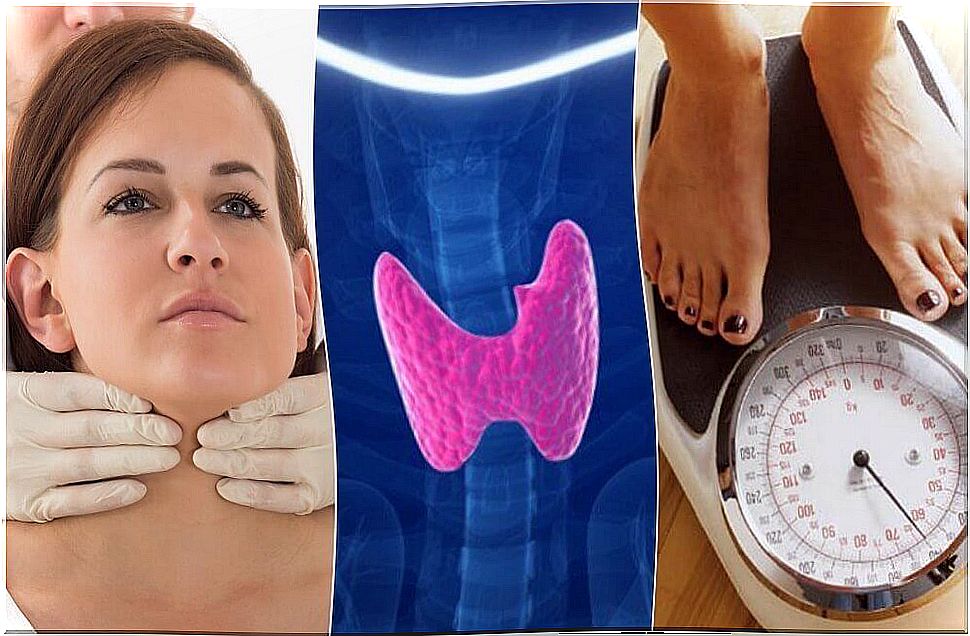How Do You Know If We Have Hypothyroidism? Meet 10 Symptoms

Hypothyroidism is one of the disorders that can affect the functions of the thyroid gland. It is caused by a low secretion of hormones, which triggers problems in various systems in the body.
It is a common disease in women over 60 years of age. However, it may appear earlier due to exposure to certain factors.
In its initial stages, it can take place asymptomatically. As it progresses, it produces several problems and symptoms that interfere with quality of life.
It is very important to know how to identify it and start a treatment that will minimize the impact it has on the body. For this reason, below we want to review some of the causes and ten key symptoms to suspect its development.
What are the causes of hypothyroidism?

The thyroid is a small butterfly-shaped gland that is located at the base of the front of the neck. Its main function is to secrete hormones such as triodothyronine (T3) and thyroxine (T4), which influence many functions in the body.
These hormones act primarily on metabolic health, maintaining the rhythm that allows the body to process fats and carbohydrates. In addition, they control body temperature, heart rate and protein production.
Hypothyroidism originates when the gland does not produce enough hormones or loses its ability to use them correctly. This situation, in turn, can arise from:
- Thyroid surgery.
- Pregnancy or postpartum.
- Iodine deficiency.
- Disorders of the pituitary gland.
- Consumption of some medications.
- Treatment for hyperthyroidism.
- Radiotherapy for head and neck cancer.
- Family history of thyroid disease.
- Autoimmune diseases like Hashimoto’s thyroiditis.
Symptoms to Recognize Hypothyroidism
For many patients, it is difficult to identify hypothyroidism due to the slow development of symptoms in the early stages. However, there are several signs that, although they may indicate other conditions, are useful in detecting you.
1. Sudden weight gain

The changes that the metabolism undergoes due to the low production of thyroid hormones can trigger a sudden increase in weight, even if the person has good eating habits.
2. Feeling of constant fatigue
Hypothyroidism affects blood circulation and reduces the body’s ability to optimally oxygenate cells and tissues. Therefore, as a result of this, fatigue is common.
3. High cholesterol levels
There are many factors that influence the rise in cholesterol levels. However, we cannot ignore that this thyroid problem can be a possible trigger.
4. Bad mood or irritability

Hormonal changes that come from malfunctioning thyroid glands can produce sudden mood swings. There is, then, a tendency to stress, depression and irritability.
5. Difficulty concentrating
The changes produced by hypothyroidism have an impact on the activity of the nervous system and the brain. Therefore, it is common for patients with this problem to have difficulty being able to concentrate.
6. Dry skin, hair and nails, a possible symptom of hypothyroidism
Beauty is also affected due to this disorder. The changes that appear in the body are reflected in an excess of dryness in the skin, hair and nails.
7. Slow intestinal transit

Slow intestinal transit or constipation can occur due to a reduction in thyroid hormones. This is due to the fact that these hormones participate in the activities of the digestive tract, which is essential for eliminating waste.
8. Muscle pain
It is difficult to interpret muscle pain as a sign of thyroid problems. Despite this, it is essential to know that at times it is the result of weakening of the muscles due to the low production of thyroid hormones.
9. Irregular menstrual periods
Altered thyroid hormonal functions can cause the menstrual cycle to fall out of control. The woman may have prolonged or heavy periods.
10. Cold sensitivity, a possible symptom of hypothyroidism
Patients with hypothyroidism have difficulties in circulation, which increases their sensitivity to cold. These people may feel cold and stiff extremities. If this is not common in the individual, it should be understood as a warning sign.
Do you recognize several of the symptoms mentioned? If you think you may have hypothyroidism, see your doctor and follow your doctor’s advice.








